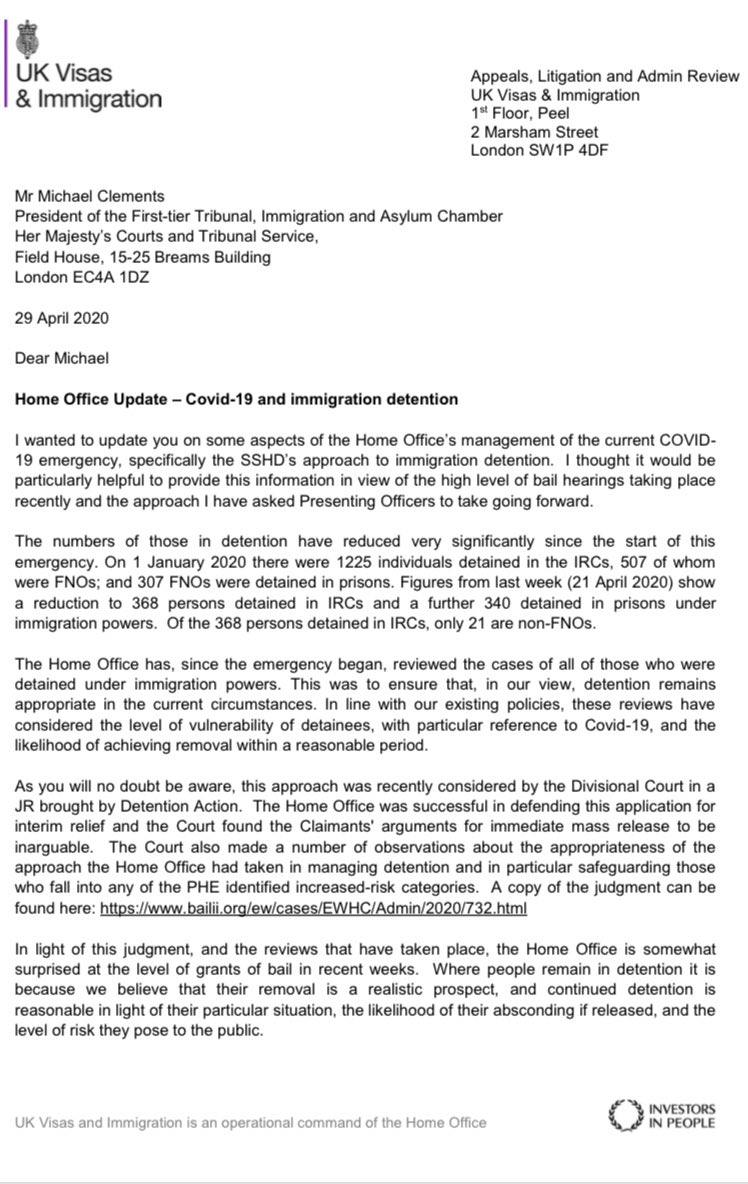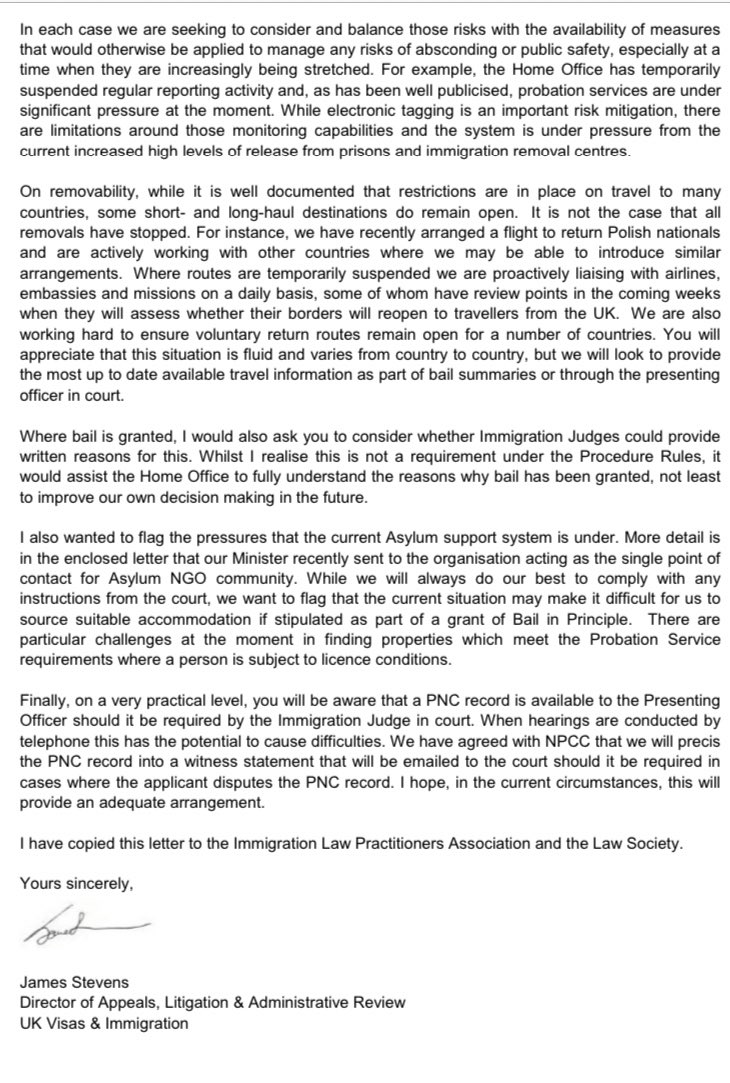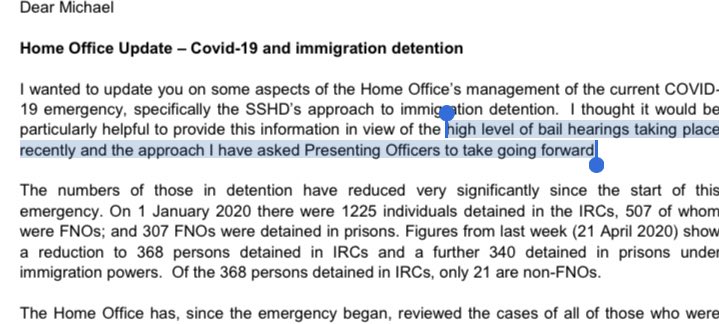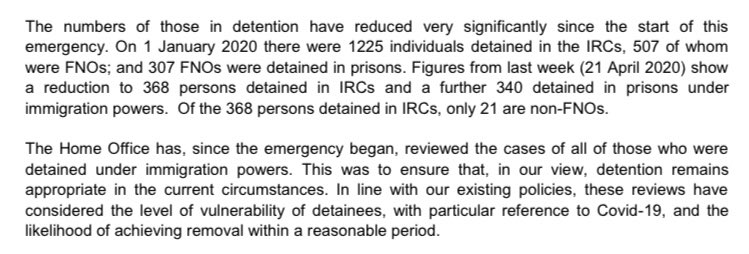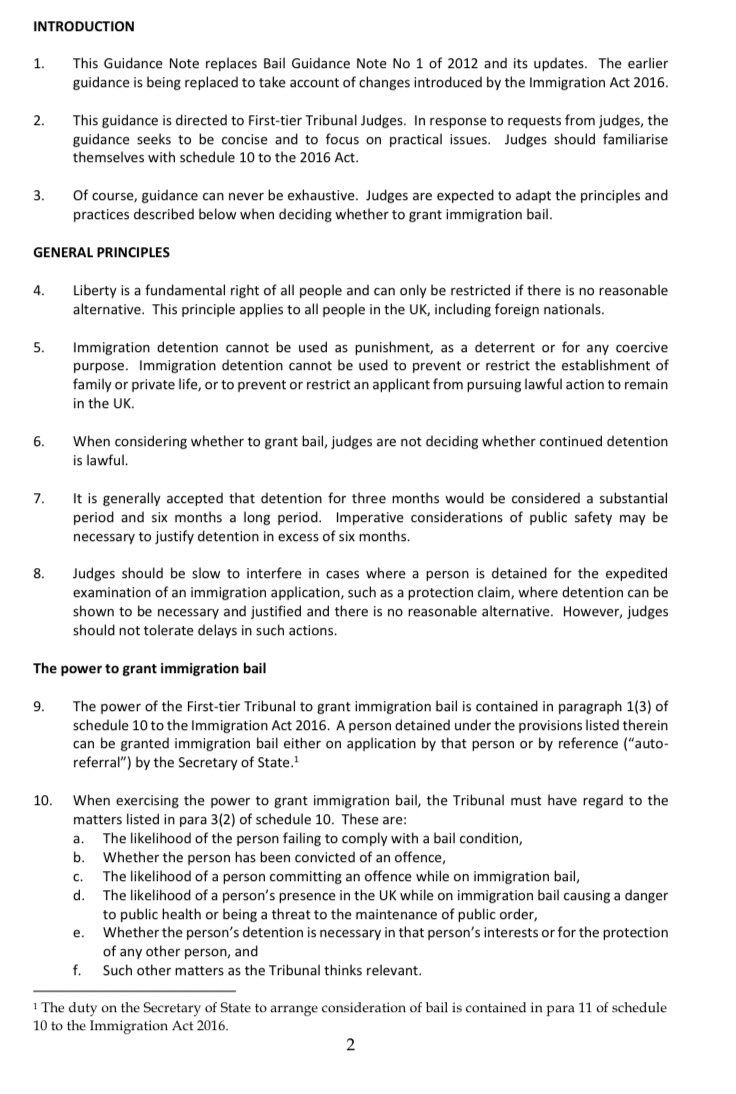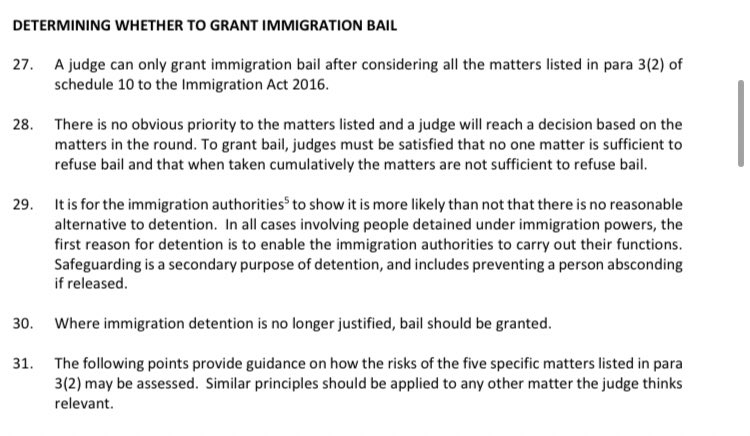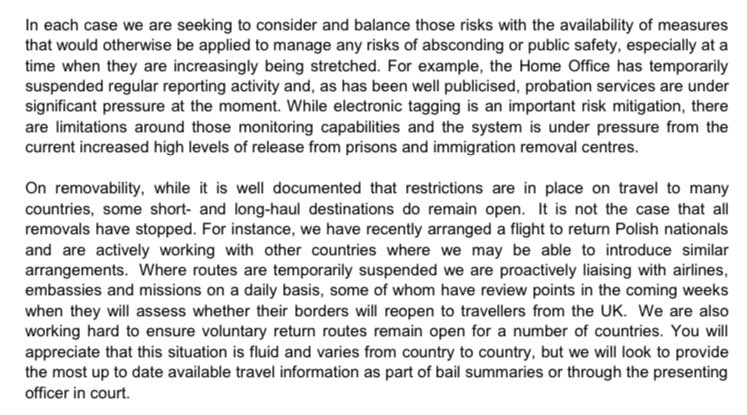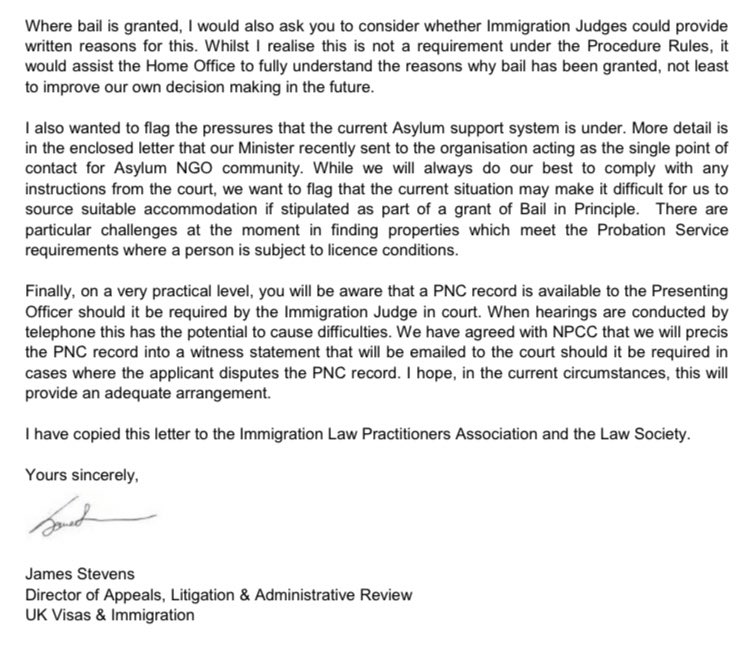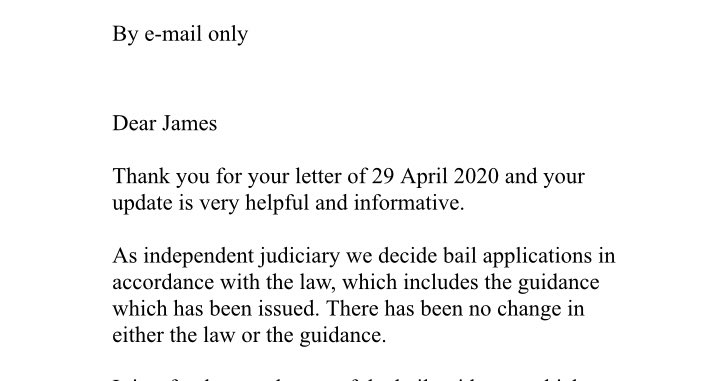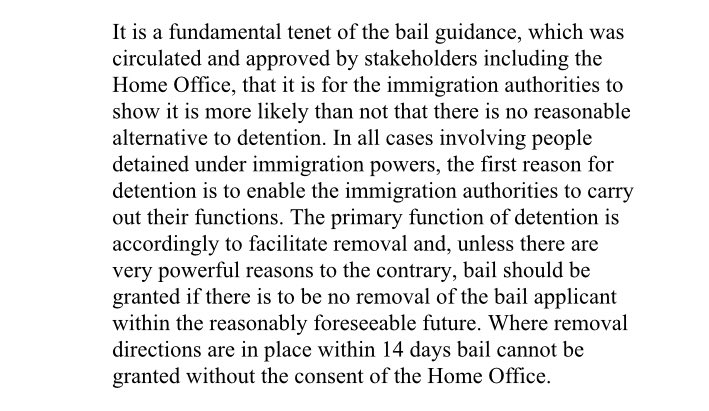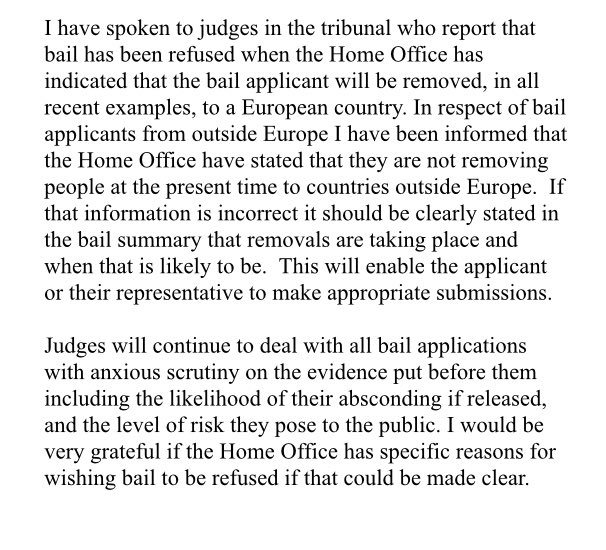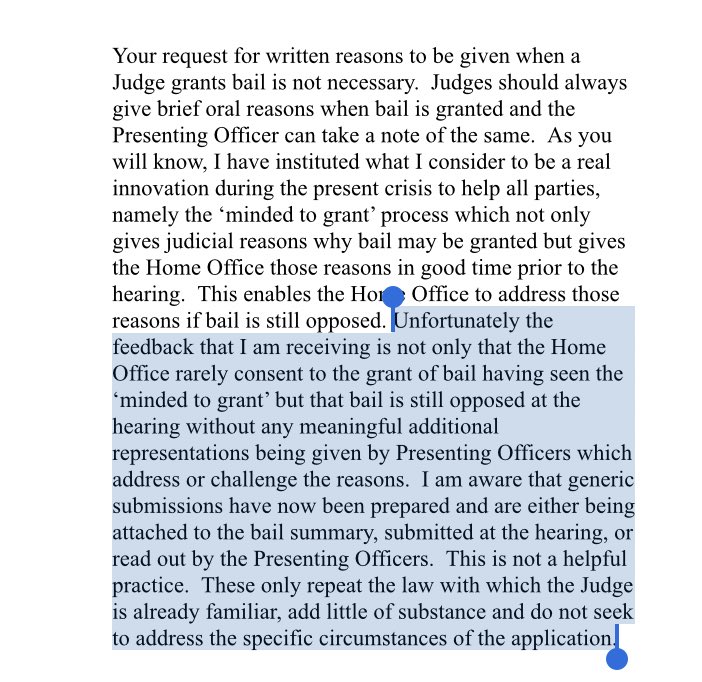The Home Office has responded to my earlier tweet by claiming that I have said something “completely untrue”.
I take defamatory attacks on my character seriously.
So let’s break down what has happened here. [THREAD] https://twitter.com/ukhomeoffice/status/1258081297068634112
I take defamatory attacks on my character seriously.
So let’s break down what has happened here. [THREAD] https://twitter.com/ukhomeoffice/status/1258081297068634112
On 29 April 2020, the Home Office sent this letter to the President of the First-Tier Tribunal, Immigration and Asylum Chamber. This is the senior judge responsible for overseeing immigration and asylum cases in the First-Tier Tribunal.
What does the Home Office wish the judge to know?
Well, it ostensibly wants to discuss “the high level of bail hearings taking place recently” in immigration proceedings, and the approach that “presenting officers” (legal officers who represent the Home Office) are taking.
Well, it ostensibly wants to discuss “the high level of bail hearings taking place recently” in immigration proceedings, and the approach that “presenting officers” (legal officers who represent the Home Office) are taking.
It starts by stating that the Home Office has reduced the number of people detained, and has reviewed all cases to ensure that, in the Home Office’s view, detention remains appropriate.
These are things you’d think a senior immigration judge might already know, but fine.
These are things you’d think a senior immigration judge might already know, but fine.
But then it gets odd. The Home Office feels the need to remind the judge - the most senior immigration judge - of its recent success in the High Court, where an attempt to secure mass release on bail of all detainees was unsuccessful.
And to send the judge a link to the judgment
And to send the judge a link to the judgment
Why this boast?
It’s because of what comes next. For this is not simply an information update to assist the judiciary. The letter contains comment.
Quite important comment:
“The Hope Office is somewhat surprised at the level of grants of bail in recent weeks.”
Ah.
It’s because of what comes next. For this is not simply an information update to assist the judiciary. The letter contains comment.
Quite important comment:
“The Hope Office is somewhat surprised at the level of grants of bail in recent weeks.”
Ah.
For one, the Home Office doesn’t appear to have understood its own victory. That High Court judgment simply confirmed the lawfulness of the Home Office’s policy - that’s not the same as saying that all detentions under the policy are appropriate and that no one should be bailed.
Bail in immigration cases is set out in this note: https://www.judiciary.uk/wp-content/uploads/2018/07/pgn-1-2018-bail-guidance.pdf
Here are a couple of extracts. But the key point is that each case turns on its own facts.
The fact that the detention scheme is lawful in principle, doesn’t mean that every individual detained should be
Here are a couple of extracts. But the key point is that each case turns on its own facts.
The fact that the detention scheme is lawful in principle, doesn’t mean that every individual detained should be
The Home Office will argue that a person should be detained. The detainee will argue that they can be safely bailed. The judge in any case will apply the legal framework and make an independent value judgment.
So assuming, as we safely can, that the judge knows the law, what possible purpose is envisaged in writing to him to express “surprise” at the number of cases the Home Office is losing?
The only conceivable answer is that the Home Office is hoping to influence future decisions.
The only conceivable answer is that the Home Office is hoping to influence future decisions.
What follows proves this. It is two paragraphs of the type of submissions that might be made by the Home Office in a bail hearing. Again, the judge will be familiar with these arguments. So why publicly put them in writing?
Again, the only answer is: to apply public pressure.
Again, the only answer is: to apply public pressure.
Likewise, one wonders what reason there is asking for written reasons to be given, when judges give oral reasons in court and the Home Office has a presenting officer who can take a full note.
One might see it as a shot across the bows. The Home Office throwing its weight around
One might see it as a shot across the bows. The Home Office throwing its weight around
This is a performative exercise in which the Home Office is effectively saying to the judiciary, “How dare you decide against us in so many bail cases? Don’t you know who we are and what pressure we’re under?”
And no doubt the HO is under pressure. But this is wholly improper.
And no doubt the HO is under pressure. But this is wholly improper.
The forum for arguing over the merits of judicial decisions is a courtroom. Not in letters in which civil servants passively-aggressively express “surprise”, ridiculously brandishing a High Court judgment of a recent victory as a baseball bat.
What of the Home Office’s claim, in their tweet to me, that the judge was grateful for the letter?
Well, it’s certainly true that the judge opens by thanking the letter writer. The Home Office can bank that.
But look at the second paragraph.
Ooof!
Well, it’s certainly true that the judge opens by thanking the letter writer. The Home Office can bank that.
But look at the second paragraph.
Ooof!
Having to start a letter by reminding the Home Secretary that “as independent judiciary we decide bail applications in accordance with the law” is a judicial Glasgow kiss.
Utterly cutting. Humiliating for a minister to have to be publicly told this.
But on we go...
Utterly cutting. Humiliating for a minister to have to be publicly told this.
But on we go...
The judge politely reminds the Home Office of what the law and the bail guidance (linked above) says.
He then addresses (although he should not have to) the substance of the complaint:
He then addresses (although he should not have to) the substance of the complaint:
As for the Home Secretary’s request for written reasons in bail cases that she loses - well this has rather backfired.
The judge introduced a practice to help the Home Office understand those reasons, and the HO is failing to engage! “Generic submissions”, “not helpful” - ouch.
The judge introduced a practice to help the Home Office understand those reasons, and the HO is failing to engage! “Generic submissions”, “not helpful” - ouch.
Finally, the judge reminds the Home Office, once more, of the law, and that “an inability of Government departments” to provide suitable bail accommodation does not, in law, justify refusing someone bail.
So in summary, the judicial response is:
“1. Thank you for your letter. It’s, umm, helpful.
2. Judges are independent.
3. You don’t seem to know the law. Here it is.
4. I tried to help you before and you failed to engage.
5. Here’s the law again.
Yours etc”
“1. Thank you for your letter. It’s, umm, helpful.
2. Judges are independent.
3. You don’t seem to know the law. Here it is.
4. I tried to help you before and you failed to engage.
5. Here’s the law again.
Yours etc”
That the Home Office suggests that the judge found its letter “helpful and informative” is indicative either of dishonesty or delusion.
So there’s my take, anyway.
I invite the Home Office to prove the truth of its tweet describing my words as “completely untrue.”
[ENDS]
So there’s my take, anyway.
I invite the Home Office to prove the truth of its tweet describing my words as “completely untrue.”
[ENDS]

 Read on Twitter
Read on Twitter